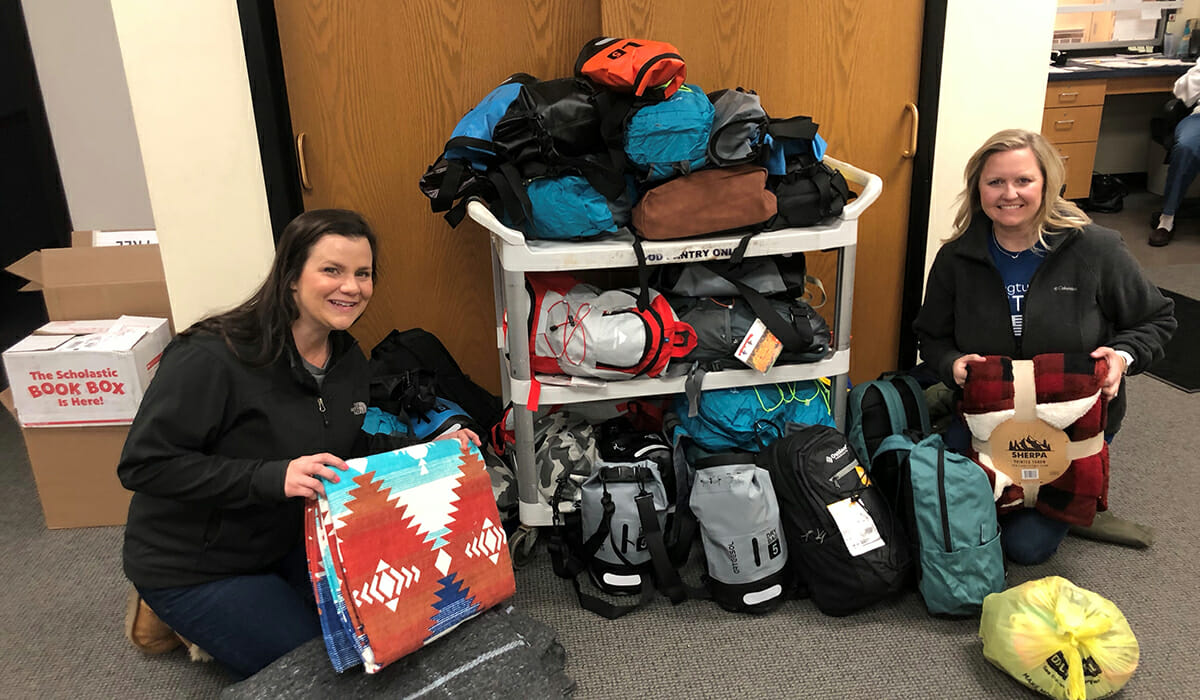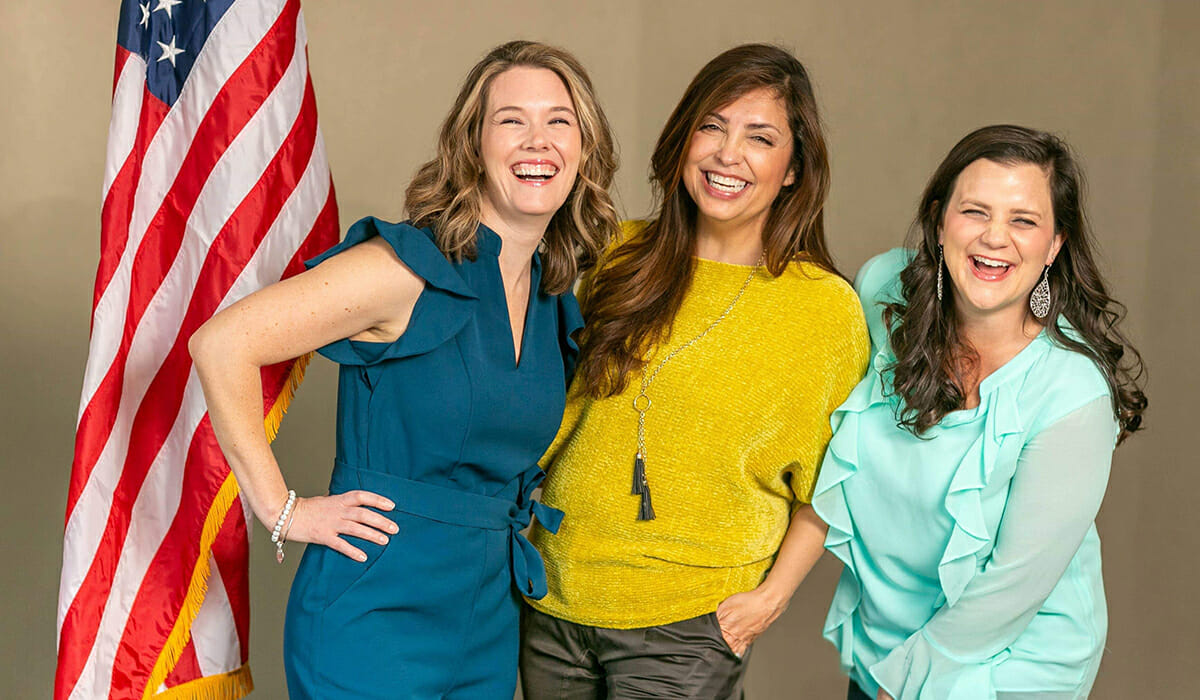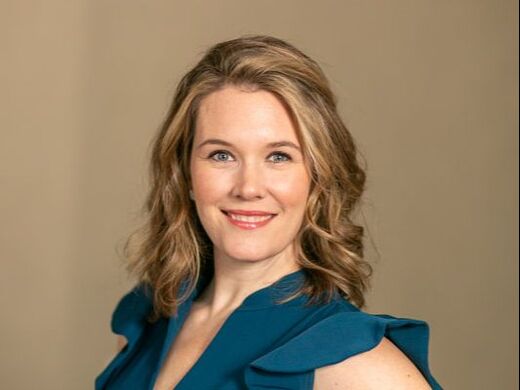Meet Daily Point of Light Award honorees Maria Reed, Samantha Gomolka and Jessica Manfre. Read their story and nominate an outstanding volunteer or family as a Daily Point of Light.
Maria Reed, Samantha Gomolka and Jessica Manfre had never met prior to last May, when all three were awarded the Armed Forces Insurance Military Spouse of the Year — Maria as Army Spouse, Samantha as National Guard Spouse, and Jessica as Coast Guard Spouse. The three ended up becoming fast friends, so much so that not even a year later, the women have started not only a movement amongst military families, but also their own foundation.
Maria, Samantha and Jessica partnered with Giving Tuesday — a global generosity movement that encourages charitable acts the Tuesday following Thanksgiving — to start Giving Tuesday Military, which specifically encourages members of the military and their families to perform acts of kindness. This past year, the Giving Tuesday Military movement performed over 2.5 million acts of kindness around the country. Further, the trio alongside close friend and Coast Guard spouse Stacy Bilodeau started Inspire Up Foundation, which aims to continue the wave of generosity that Giving Tuesday Military sparked.
CAN YOU DESCRIBE WHAT GIVING TUESDAY MILITARY IS?
Samantha: Giving Tuesday Military is a movement that was born last September to really find a way to bridge the military-civilian divide, but in a way that wasn’t expected. A lot of what is done is for military families — the civilians doing it as a sign of appreciation. We wanted to flip that script and use military families who already have service hearts to go into the community, make our presence known, and build those relationships and ties with our civilian counterparts through intentional acts of kindness.
HOW DID YOU THREE MEET AND COME TO START THIS ORGANIZATION?
Jessica: The three of us were honored with titles of Military Spouse of the Year in May of 2019, so Sam was National Guard Spouse of the Year, Maria was Army Spouse of the Year and I was Coast Guard Spouse of the Year. When we all met, we were friends immediately. Maria has a show called ‘Moving With the Military‘ and she does home makeovers for military families all over the country. When we met, she was like you know, we never featured a Coast Guard family, I would love to work with you. That’s really how it all started. We worked all summer long and we did this makeover. It was an absolutely life-changing experience. I had followed Giving Tuesday for some time, and on a whim I Facebook messaged Giving Tuesday and shared the episode and said “This was so unbelievable and impactful on my life to watch this community come together, I just wanted to share it with you.” Didn’t think I would get a response because they’re so large, but their communications director wrote me back. She was like, “I’m in tears, this is amazing, have you guys ever thought of running a campaign for Giving Tuesday?” That’s really where we all began. We had a conference with them in September. We knew we didn’t want to focus on money. We wanted impactful change, we wanted acts of kindness, we wanted people to be intentional in their life. Our whole entire movement was based on that and based on our goal of one million acts of kindness.
WHAT KIND OF VOLUNTEER PROJECTS HAS GIVING TUESDAY MILITARY DONE?
Maria: Giving Tuesday is usually a specific day. It’s the day after Cyber Monday which is the three days after Black Friday. When we think about all of those days, like Jessica said, they’re usually all about money. When you think about Giving Tuesday, it is usually the number one day for nonprofits to receive donations. Bringing in the military community, we knew we wanted everyone to be able to do something regardless of their financial situation. It wasn’t about money, it was about acts of kindness. Acts of kindness range from the Junior ROTCs at the different high schools went onto the military installations and they served the service members. They also served in the community with garbage cleanup, helping the elderly paint their homes, help clean their yards, clean their homes, delivering of baked goods to random people in the community. Simple acts of maybe buying someone a cup of coffee in the line behind you at Starbucks, or as easy as opening a door and saying “I hope you have a wonderful day today.” They do it on purpose, that “OK, I’m going to help this person, how can I help you?” Take your groceries to your car. Leaving things like money at the laundromat with a little box of detergent. Calling people you hadn’t called in a while, leaving a message for someone. Baking things, we baked lots of goods. A high school group left Post-It Notes all over the lockers in their high school with messages of affirmation, “you’re enough,” “you are doing incredible things.”
When we started this movement, we thought it would be one million acts of kindness, and we ended up finding out it was over 2.5 million. I don’t think we’ll ever really know the exact number, but it was at least 2.5 million. It just spiraled. We wanted people not to boast about it, not be like “Hey look at me, look what I did,” but “Today I did this,” and how they felt by doing it, how it impacted them. They hoped what they did helped another person, but how it impacted them as well.
HOW HAS GIVING TUESDAY MILITARY CONTINUED THROUGHOUT THE YEAR?
Jessica: Military spouses as a whole I think have such a volunteer heart. Us being in different states, we have different things we’re involved in, whether that’s the VFW [Veterans of the Foreign Wars of the US] or homeless shelters, constantly utilizing our group we have. On Facebook, we have a group that has about 4,000 people in it, so trying every week to engage with them, sharing acts of kindness. From that big movement, other groups developed all over the world, and they are still doing things, so they’re sharing with us what they’re still doing. Obviously with coronavirus impacting our ability to go out and do things, that’s changed. We’ve really been focusing on digital kindness and trying to touch on cyber bullying and do things with the kids. I don’t think there’s a day that we aren’t doing some kind of service project, to be honest.
Although Giving Tuesday isn’t really until December, they are doing an emergency Giving Tuesday [on May 5] in light of everything that’s going on. We’ve come up with a couple different initiatives to help promote under Giving Tuesday Military so we’ll be working quite a bit.

WHAT ARE YOU DOING ASIDE FROM GIVING TUESDAY MILITARY?
Samantha: April 1 is when we [launched] our new foundation. It’s called Inspire Up Foundation. Once we did the action report of Giving Tuesday Military, we knew the impact was so great on both the givers and receivers that it couldn’t be contained to one day. We really had to find a way to perpetuate kindness every day throughout the year. We had someone say “#givingalways.” That was a driving force between our strategy sessions. We have initiatives that fall underneath Inspire Up, and one of them is #LoveMilKids. We’ve received uniform donations all over the world for all branches of the military and we have been making stuffed hearts to send to military children. The first 500 have been [free through sponsorship of First Command Financial and Scott Credit Union]. Then we’re going to be receiving monetary donations where someone can sponsor a heart. They can donate a heart to send to other children. We’ve also spoken about expanding that, especially in light of coronavirus, to Hearts for Heroes. So all first responders, people on the front lines right now using their own bravery and courage and sacrifice, all ideals we really cherish, to honor them. We’ve been hard at work doing this behind the scenes.
Maria: One of the reasons [we launched on] April 1 is because April is the Month of the Military Child, so we can make sure we can get the hearts into the hands of as many military kids as possible. Those hearts would be free to military families. They’re being made from repurposed old military uniforms, so they can be from a different generation. That, I think, is what’s the beauty. The veterans who have donated those uniforms, they’ve said you’re giving us a purpose. They’re like, “I can do this,” and “Yes, take my old uniform, it was just sitting there in the trunk.” Getting them to us feels like it’s going to help these military kids, especially during this time because there’s so much of the unknown and insecurity. It’s a way to give children something to hold onto and be proud.
WHY IS IT IMPORTANT FOR MILITARY SPOUSES AND FAMILIES TO HAVE ORGANIZATIONS LIKE THIS?
Maria: Military families, because we are all over the world in different places and not necessarily even near military installations for many of [those with a permanent change-of-station order]. Many military families have reached out that they feel isolated. They don’t feel connected with the military community, or any community, for that matter. They oftentimes feel like the civilian community doesn’t want to be their friend, if you will, because they’re like, “you’re going to leave, you’re not going to be here.” That happened to me where civilians did not want to have their kids be friends with my kids because they knew we were going to be leaving some day, and that to me has to stop. We are a people, we are a human race, we all need to connect. I think this is so important for military families because it gives them a purpose. It gives them a way to feel connected to their community, and even if they can’t physically go out and do something, if they can be perhaps organizers for different events, being able to put all those things together — it really gives them a mission. I think military families, we’re very much mission orientated. Give us a task, give us a purpose, and we’re on it, we’re going to get it done. I think it’s very, very important for the wellness and mental health of military families.

WHAT’S BEEN THE MOST REWARDING PART OF YOUR WORK?
Samantha: I think it comes back to it was never about the number. One million acts was our pie-in-the-sky goal. Maria had discussed it during one of the interviews that the military represents one percent of the population and that would have been a big number to reach. But also during our strategy sessions, we knew if we could impact one life, that all of this would be worth it. The stories that really stayed with us were how people were impacted, how people felt a sense of belonging. We had deployed soldiers who participated in Giving Tuesday Military. They had just come out of the field. They hadn’t had normal food or coffee in six weeks. The one act of kindness was that he went to a Starbucks to buy the cup of coffee that he had been thinking about for weeks. He saw a homeless gentleman, and even before he took a sip fo coffee himself, he handed it to him and kept walking because he had to report for duty. I think that speaks from the heart as such a true act of kindness, that people are giving whatever they have to give. It changed me. Going into it, I always thought I was nice, but not necessarily kind all the time, really looking for opportunities. It changed the way I lived my life, looking for those nooks and crannies where I can infuse that for somebody else.
Jessica: We all three have always been involved in service of some kind. I think it just solidified for me that this is what we’re meant to do. There’s no one story that stands out above the others. I want to live that everyday. I think that’s the end for me — I want that to be my everyday. I want that to be everyone’s everyday.
Maria: For me, I think the biggest thing was working with youth. They’re so touched and moved by everything they see on social media, and sadly most of the time, it’s not good. There’s a lot of negativity wrapped up in this whole ‘my Instagram life,’ and I’m like, but that’s not real life. Let’s show them a better example. Seeing all of these different high school groups, these kids, step up and become leaders, and then their groups stepping out in their community and doing things — that’s our future. That’s what it’s going to look like. It’s not going to look like all this negativity and hate we’ve been seeing. It’s going to be kind and it’s going to be good. What I saw in young people, that left such an impact on me.
WHAT DO YOU WANT PEOPLE TO LEARN FROM YOUR STORY?
Maria: I want people to know that ordinary people can do the extraordinary.
Samantha: Absolutely. We’re not business gurus. We’re coming together to learn nonprofits together. This was totally a passion project. It was an idea hatched in September. We didn’t know if it was going to work, but we certainly weren’t going to take no for an answer. We kept talking and promoting and asking, and people shared with our vision and chose to stand shoulder to shoulder with us, and we changed the world. We may not know how to do it, but we’re determined to figure it out. I think if anybody has that source of passion, they just need to go with it, because it could change the world quite literally.
Do you want to make a difference in your community like Maria, Samantha and Jessica? Find local volunteer opportunities.









